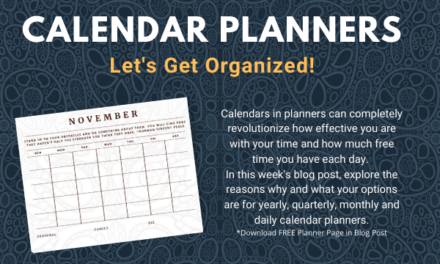Every project needs a plan and here’s why this is critical to the life of your biz!
And to actually having an enjoyable personal life!
If you don’t have a plan, then you are not planning for success. It is key to visualize what you want to accomplish, then lay out the steps and details. This is the basic idea behind project management.
Successful biz owners will tell you that they have processes, systems and plans in place that help them accomplish their goals and grow their businesses. It is quite difficult, if not impossible to run a profitable enterprise without these essential elements.
On a personal note, it is also quite difficult to have a relaxed and rewarding home life if you are scattered and disorganized. Having my day planner next to my computer keyboard keeps me on track during the day and gives me a great place to take notes and write reminders. Then I have my google calendar that sends me reminders for appointments along with locations, who you are meeting with, what you need to bring, etc. This helps me keep everything on track with my family and gives me many opportunities to pencil in free time for myself.
How Project Management Can Transform Your Work Life, Personal and Home Life
Planning Provides Focus and Direction
Not using a project planner is like planning a trip to another state (or country) without consulting a map. Most people wouldn’t think about doing this because they know that their trip will have a much greater chance of success if they know where they are going before they start out.
So why do people take on projects without planning for them? I think that it is because the map was already created for you when you travel. Geography is geography. It doesn’t change that often. When it comes to project management you are basically creating your own map of the project each time. It takes planning and foresight to create a unique map for every new venture
This can be a more difficult thing to do and especially if you don’t have a project management system to rely on that helps you plan for each one quickly and easily. Fortunately there are quite a few options for managing biz, home and personal projects.
In the beginning, your plans don’t have to be perfect. Start simply with a notebook and a list if you want. The important part is to get focus and direction and set goals.
Setting Goals and Having a Clear Understanding Of What You Want to Accomplish
What are you trying to do, what exactly does this look like? What is the outcome you are looking for? What does complete look like? How will you know when you are done?
Getting clear and setting goals during the planning phase of a project can help you measure progress and take corrective action as necessary. Also make sure your project goals are aligned with your biz, family or personal goals. This will help your project stay on track and support your bigger picture goals.
Assessing Skills, Risks and Understanding Obstacles and Roadblocks
It is a good idea to examine the skills and knowledge needed to complete the project. Do you need to learn something specifically that you don’t already know and is critical to completion? If this is the case, allow time for learning and budget in the cost of learning.
Do you need to hire an external contractor? What does this entail? Are there any other obstacles and/or roadblocks that should be identified early? It’s a lot better to know ahead of time than when you are in the middle of the project.
Budgeting & Increased Profitability
What is it going to cost to complete this project. Where is it in the priority level for this cost/benefit? Is there a better time or does this need to be done now? What is the impact of spending this money right now? Do you need to borrow money or do you need to bring money from another area into this one? Or do you have plenty for everything you have going on?
Create a budget for the project at the beginning and be realistic. Know where you are spending money and why. Then add 20% or so just to be safe. Track the spending as you move through the project to maintain maximum profitability.
Establishing Timelines and Milestones
Put specific milestones on the calendar in the beginning of the project and keep the calendar updated. This is critical to staying on track with the overall plan. If you stay on track with your milestones, it is more likely that you will meet your goal deadlines.
The number of milestones you need will depend on the complexity and timeline of the project. Daily, weekly and/or monthly milestones are all relevant to different projects. It’s helpful to start with a project completion date and then work backwards. See if you actually have enough time to complete everything.
If you see that you don’t have enough time then either adjust the completion date or the project goals/expectations. Know this before you start.
Sometimes simply putting dates down on a calendar will give you a visual clue as to how realistic deadlines can be. It’s much better to get done early than to run really late.
Allocating Resources & Sharing Responsibility
What do you need to complete the project. Is there too much on you and/or do you need help? Human resources, financial resources and equipment resources are all things you need to account for and create realistic estimates for. Inventory, contractors or employees and equipment will all need to be thought of and planned for.
Make sure too much doesn’t land on any one person, including you. Taking stock before you start is a good way to avoid feeling overwhelmed or running into unpleasant surprises.
Communication
Who needs to do what by when. How is this being tracked and who is responsible for tracking and also getting done. Who is tracking milestones and staying ahead of potential roadblocks?
Communication is key to any project that involves more than one person. Shared electronic calendars and project management software such as Trello or Asana can help you stay in constant communication with stakeholders. People will know what is going on and feel connected to the project and outcomes. They won’t worry about what’s happening because they will know.
Avoiding Scope Creep
Scope creep is what happens when project expectations are not clearly established upfront. Many times specific project details are not understood in the same way by multiple parties. For example, The client keeps adding requests that the contractor was not anticipating. Or the contractor doesn’t provide the level of service or support the client was expecting.
Either way it is a great way to get a bad feeling about a project. When you put together a formal project management plan you have the opportunity to lay out and agree to all the details of a project before you start it.
Project Review and Opportunity to Improve
How did it go? A project review is a great time to look at where you started, what was done and how it turned out. You have the opportunity to look at improvements and also celebrate what when really well.
Starting a project without a plan is like going on a road trip without a map. The longer the trip the more likely you are going to get lost along the way!
Daily Project Management
If you approach each day as a project then you can break it down and stay on top of everything that is happening as you go. Goals, appointments, water breaks, meals, grocery and to do lists and more. Keep it all together and make sure things get done.
Project Management is all about organization, planning and accomplishments. It can be quick and easy to reduce stress and overwhelm when you plan ahead and stay organized each and every day.
Just in case you are looking for a fresh new daily planner, you can right click to download ‘Today’s Plan’ planner and get started quickly and easily!
*right click to download and print our FREE daily planner
If you are looking for a full year’s planner, click here to download our 2019-2020 creative planner shown below.

©Copyright 2021 + - Omaste Witkowski, Zen Biz Boss, Artworks, Self Care Toolkits, Motivational Artwork ™ All Rights Reserved


















